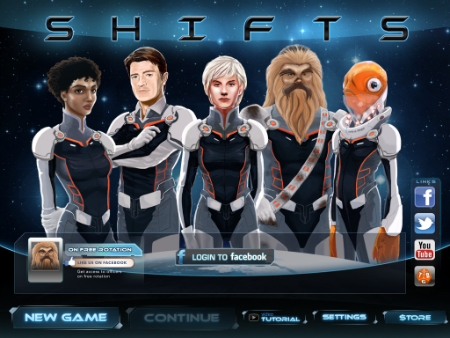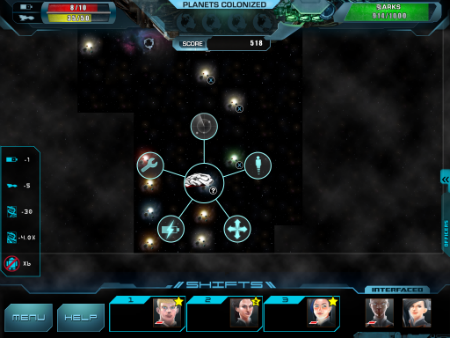Shifts - How financial woes made a good game bad
A solid product and positive press is no guarantee of success in the mobile world

Just over a year ago, a sci-fi strategy game from new studio Threadbare Games hit the App Store. It was called Shifts.
Shifts got off to a good start, and received a largely positive press reaction.
I played it, liked it, deleted it, and forgot about it, happy in the knowledge that another up-and-coming indie developer was marking out solid territory for itself.
Shifting tackExcept, as it turns out, it wasn't. I recently re-installed Shifts and discovered that the game had been drastically changed.
In place of a fixed challenging-yet-fun difficulty level, there was an "Easy" option. Instead of a fixed crew roster, you could now upgrade your ship's officers through IAPs. And it had become a free-to-play experience, complete with intrusive in-game ads.
After such an extreme makeover, which I thought was strongly for the worst, I couldn't help but be curious about the story behind the alterations.
Thankfully, Threadbare has a strong policy of user engagement, and was keen to talk.

In fact, Threadbare founder and CEO Zach Larson stepped up to the plate.
"Part of getting better at making stuff is interacting with the people who use your stuff," Larson told me. "Constant customer feedback is an important thing."
Before we continued our conversation, I asked Threadbare's CEO for some background about the company itself. He was happy to oblige.
"We knew we wanted to make games for the mobile market that provided a satisfying game in 5-15 minutes," Larson said.
"We looked at the stuff that Rodeo Games put out and tried to imagine what we, as a bunch of game newbies, could design, make, and ship in three months. We didn't know if it would be a successful business model or not."
Flying startWith the glowing reviews that Shifts garnered on release, I'd presumed it'd be deservedly flying off the virtual shelves. I was wrong.
"It did lead to sales spikes," Larson admitted, "but the numbers were so tiny that it didn't matter. If on your best day you sell 265 units of a £1.49 / $1.99 product, you'll never get anywhere as a business."
Plus, it's easy to forget when you're guesstimating a developer's revenue that Apple takes a 30 percent cut of the profit. And that critical praise doesn't automatically translate into sales.
Numbers gameOver the following months, Threadbare experimented with the game's price, with little effect.
"We got the best numbers at £1.49 / $1.99," Larson told me. Until Threadbare did something more drastic.
"We made it free for a weekend. And got 5,000 installs on our best day. All of a sudden, we had lots more people playing it on a daily basis."
Unsurprisingly, it didn't last.
"As soon as we switched back to paid, the installs stopped," Larson admitted.

Struggling under the weight of its own inexperience and crippled to some degree by Apple's 30 percent cut, Threadbare thought it had to take a gamble.
"We weren't making enough money, at all, to justify even having made Shifts," Larson lamented. "We felt we had to try some other experiments to see if we could generate some revenue."
Worried by the situation, Threadbare rushed headlong into a free-to-play world. Larson was disarmingly honest in confessing a catalogue of mistakes his firm made in switching Shifts to a freemium model.
Lite touchOne was that it generated understandable outrage from people who'd already paid for the app.
"We messed up here," Larson admitted. "We should have released 'Shifts Lite'. But we didn't really have the resources to support multiple versions of the game."
That outrage led to a commendable conversation between Threadbare and its customers, in which the studio listened to feedback and acted on it.
The first change Threadbare made was enabling customers who'd bought IAPs in the game to turn the ads off. Alas, this particular setting was buried in the options menu and wasn't clear to users. Another error.
"Badly thought out and hastily done," Larson confessed. "If we had to do that over again, I'd absolutely do things differently."

But Threadbare could have coped with all of the fallout from that mistake if its switch to an F2P model had resulted in more people playing Shifts and generating more revenue.
The team got halfway there.
"More people played it," Larson told me. "That made me happy. And they seemed to like the new IAP officers."
"But after factoring in user acquisition costs, the game got to an ARPDAU (Average Revenue Per Daily Active User) of $0.08, and almost none of that was ads. There weren't enough people playing it."
Community spiritFaced with an increasingly angry community and no profit to show for it, Threadbare recently did the decent thing and removed the ads. Perhaps more surprisingly, it left the game free.
I couldn't help but wonder whether a free game reliant on non-essential IAPs alone could make money.
"Actually, we've lost money," Larson conceded. "Since we're no longer showing ads for other games, we don't receive any revenue for it. The numbers are small, though, so it made sense to do it to return the game to some sort of happy balance."
And those users who originally ponied up for what's now a free title?
"They have our gratitude," Larson said, "and we hope that they'll continue to like the game."
Pay upThreadbare has made two more games since Shifts (Terra Omega and Goblin Grand Prix), but both are still in development. So, how does the company stay afloat?
"We've gone back to our previous lives as technical product makers for other folks," Larson told me. "It's not the same as making a game, but it does pay our rent."
Threadbare has learnt its lessons from this 'sorry saga with a bittersweet ending'. But it's an instructive tale for small developers looking to succeed on the App Store.
Even with the backing of positive press, Shifts sank like a stone. The problem was then exacerbated by a series of bad decisions on the part of the developer.
Everyone's a criticAs a player, it's easy to be an armchair critic of studios. But when the choices these studios make represent the difference between putting food on the table or not, it's hard to do the right thing.
I think it's only right to give Larson the final words on this subject.
"If we thought we could make even a meagre living making more awesome versions of Shifts (or games like it) and selling it on mobile, we would. But we haven't found a way to do that yet."
